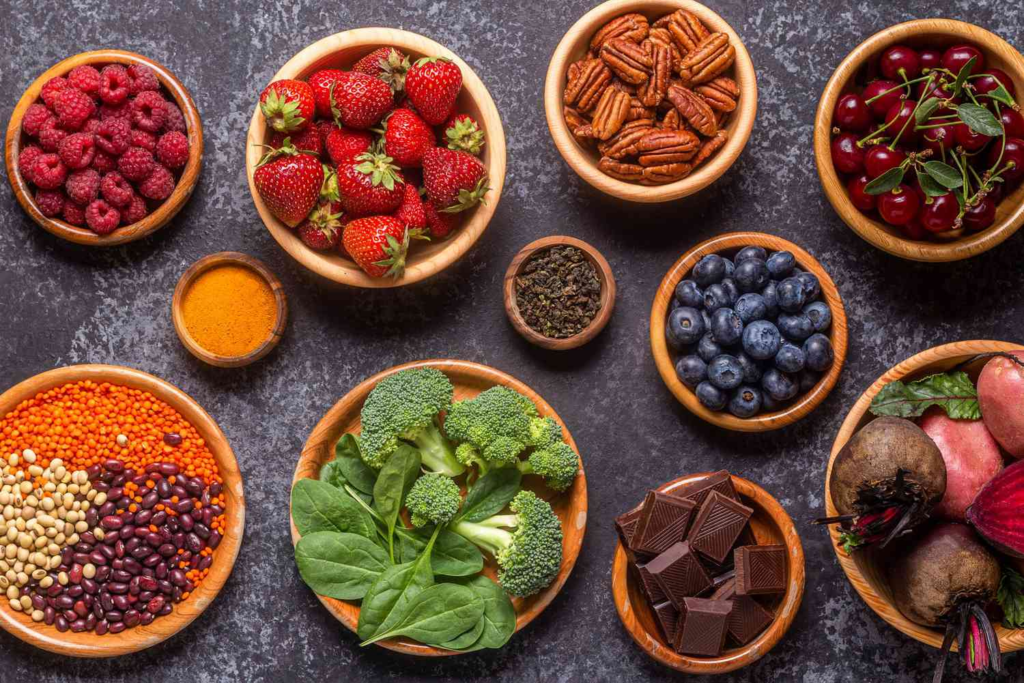Are you looking to boost your overall health and well-being? Including antioxidant-rich foods in your diet can be a great way to support your body’s natural defense system against oxidative stress and free radicals. In this article, we’ll explore 10 delicious and nutritious foods that are packed with antioxidants to help you live a healthier life.
1. Berries
Berries such as strawberries, blueberries, raspberries, and blackberries are excellent sources of antioxidants, particularly vitamin C and flavonoids. These powerful compounds help protect your cells from damage caused by free radicals, which may reduce the risk of chronic diseases like heart disease and cancer.
2. Dark Chocolate
Yes, you read that right – dark chocolate is rich in antioxidants! Cocoa beans contain flavonoids, including flavonols and polyphenols, which have been shown to have antioxidant properties. Opt for dark chocolate with a high cocoa content (70% or higher) to reap the most benefits.
3. Leafy Greens
Leafy greens like spinach, kale, and Swiss chard are packed with antioxidants, including vitamins A, C, and K, as well as lutein and zeaxanthin. These nutrients help protect your eyes, promote healthy skin, and support overall immune function.
4. Nuts and Seeds
Nuts and seeds, such as almonds, walnuts, and chia seeds, are rich in antioxidants like vitamin E, selenium, and zinc. Incorporating a variety of nuts and seeds into your diet can help reduce inflammation and support heart health.
5. Green Tea
Green tea is loaded with antioxidants called catechins, which have been linked to a reduced risk of heart disease, cancer, and other chronic conditions. Enjoy a cup of green tea as part of your daily routine to reap its health benefits.
6. Tomatoes
Tomatoes are rich in the antioxidant lycopene, which gives them their vibrant red color. Lycopene has been shown to have anti-inflammatory and anticancer properties, making tomatoes a valuable addition to a healthy diet.
7. Red Wine
Moderate consumption of red wine has been associated with numerous health benefits, thanks in part to its antioxidant content. Red wine contains resveratrol, a polyphenol that may help protect against heart disease and improve longevity.
8. Beans and Legumes
Beans and legumes, such as lentils, chickpeas, and black beans, are excellent sources of antioxidants, fiber, and plant-based protein. Including beans and legumes in your diet can help stabilize blood sugar levels, promote digestive health, and reduce the risk of chronic diseases.
9. Turmeric
Turmeric is a spice known for its vibrant yellow color and potent antioxidant properties. Curcumin, the active compound in turmeric, has been studied for its anti-inflammatory effects and potential role in preventing and treating various diseases.
10. Oranges
Oranges and other citrus fruits are packed with vitamin C, a powerful antioxidant that helps protect cells from damage and supports immune function. Including citrus fruits in your diet can help boost your intake of antioxidants and promote overall health.
FAQs (Frequently Asked Questions):
- What are antioxidants, and why are they important for health?
- Antioxidants are compounds that help protect your cells from damage caused by free radicals, which are unstable molecules that can harm your cells and contribute to aging and disease. Consuming foods rich in antioxidants can help neutralize free radicals and support overall health.
- How can I incorporate more antioxidant-rich foods into my diet?
- To incorporate more antioxidant-rich foods into your diet, focus on eating a variety of fruits, vegetables, nuts, seeds, and whole grains. Try adding berries to your morning oatmeal, snacking on nuts and seeds, and including leafy greens in your salads and smoothies.
- Can antioxidants help prevent chronic diseases like cancer and heart disease?
- While more research is needed, studies suggest that antioxidants may play a role in reducing the risk of chronic diseases like cancer and heart disease by protecting cells from damage and inflammation. However, it’s essential to maintain a balanced diet and lifestyle for overall health and disease prevention.
- Are supplements necessary to get enough antioxidants?
- While supplements can be beneficial for some individuals, it’s generally best to obtain antioxidants from whole foods as part of a balanced diet. Whole foods provide a variety of nutrients and phytochemicals that work synergistically to promote health and well-being.
- Are there any potential side effects of consuming too many antioxidants?
- While antioxidants are generally safe and well-tolerated, consuming very high doses of certain antioxidants through supplements may have adverse effects. It’s best to obtain antioxidants from a varied diet rather than relying on supplements to avoid potential side effects.

